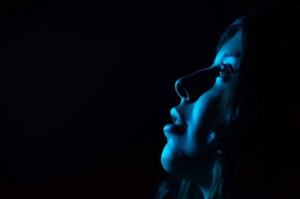In our technology-driven world, we are constantly surrounded by screens. Whether it’s our smartphones, tablets, computers, or televisions, blue light exposure has become an unavoidable part of daily life. But what exactly is blue light, and how does it affect our bodies? More importantly, how can we mitigate its effects to protect our health?

Understanding Blue Light
Blue light is a high-energy, short-wavelength light that is part of the visible light spectrum. While blue light is naturally present in sunlight, our increased use of digital devices has significantly boosted our exposure. Studies have shown that prolonged exposure to blue light can have several adverse effects on our health, especially considering that our eyes aren’t very good at blocking it.
Sources of Blue Light
The most significant sources of blue light are electronic screens, LED lighting, and fluorescent lights. With the average person spending more than 10 hours a day in front of screens, blue light exposure has reached unprecedented levels. While natural blue light from the sun is essential for regulating our sleep-wake cycles, the artificial blue light from screens disrupts these natural rhythms.
Disrupts Sleep Patterns
One of the most concerning effects of blue light is its impact on sleep. Blue light exposure, particularly in the evening, can interfere with the production of melatonin—a hormone that regulates sleep. Reduced melatonin levels make it harder to fall asleep and can disrupt sleep quality. Wearing Block Blue Light glasses in the evening can help mitigate this by filtering out the harmful blue wavelengths, allowing your body to produce melatonin naturally. Interestingly, a study published in the Journal of Clinical Endocrinology & Metabolism found that participants exposed to blue light before bed experienced a delay in falling asleep and had a shorter duration of sleep. This disruption can lead to chronic sleep deprivation, which has further health implications, including weakened immunity and increased stress levels.
Eye Strain and Digital Fatigue
Spending long hours in front of screens can lead to digital eye strain, also known as computer vision syndrome. Symptoms include dryness, irritation, and difficulty focusing. Blue light contributes significantly to these issues because our eyes struggle to filter it.
Experts recommend the 20-20-20 rule as an effective way to reduce digital fatigue. Every 20 minutes, take a 20-second break and look at something 20 feet away. This simple exercise helps relax the eye muscles and reduce strain. Additionally, setting up your workspace with proper lighting and ensuring that your screen is at eye level can make a big difference.
Potential Retinal Damage
Prolonged blue light exposure has been linked to potential retinal damage. Studies suggest that blue light can penetrate deep into the eye and damage the retina’s light-sensitive cells, potentially leading to conditions like age-related macular degeneration (AMD).
While more research is needed to fully understand the extent of this damage, it is wise to take preventative measures. Using screen filters and setting devices to “night mode” can reduce the amount of blue light emitted. These small changes can help protect your eyes in the long term.
Impacts on Mental Health
Blue light doesn’t just affect physical health; it can also have mental health implications. Exposure to blue light, especially at night, can disrupt circadian rhythms. This disruption has been associated with mood disorders such as depression and anxiety.
A study by Harvard Medical School revealed that blue light exposure at night can suppress melatonin production twice as long as other light wavelengths, making mood regulation even more difficult. Creating a bedtime routine that reduces screen time an hour before bed can help maintain mental well-being.
Blue Light and Skin Health

Recent research has shown that blue light may also affect skin health. Blue light exposure can generate free radicals, which can accelerate the aging process and contribute to skin damage. Dermatologists recommend using skincare products that contain antioxidants to combat these effects.
Applying a broad-spectrum sunscreen that protects against both UV and blue light can provide an added layer of defense. Limiting screen time and using blue light filters on devices can further help protect your skin from premature aging.
Tips for Reducing Blue Light Exposure
Reducing blue light exposure doesn’t mean you have to ditch your devices altogether. Here are some practical tips to help you manage your screen time more effectively:
- Use Blue Light Filters: Many devices come with built-in blue light filters that can be activated in the settings. These filters reduce the amount of blue light emitted by screens.
- Wear Blue Light Glasses: Specialized glasses can filter out blue light, making it easier on your eyes, especially during extended screen use.
- Limit Screen Time Before Bed: Try to avoid screens at least an hour before bedtime to help your body produce melatonin naturally.
- Optimize Your Workspace: Ensure your screen is at eye level and use proper lighting to reduce glare and eye strain.
- Take Regular Breaks: Follow the 20-20-20 rule to give your eyes periodic breaks and reduce digital fatigue.
Blue light is an integral part of our digital lives, but its effects on our health shouldn’t be underestimated. From disrupting sleep patterns to causing digital eye strain, the impact of blue light is far-reaching. By taking proactive steps such as using blue light filters, wearing specialized glasses, and limiting screen time before bed, we can protect our eyes and overall health.



